Every successful training program starts with choosing the right LMS. Planning to onboard new employees around the world at different intervals? Or, perhaps you need the best learning management system that integrates well with your existing HR and other tools. You may want to sell your courses online and need eCommerce features built-in from day one.
If you’re looking for an online learning solution for your business but unsure where to start, you’re in the right place. Let’s take a closer look at the best LMS platforms for 2024, the top LMS features, and the ideal use scenarios for each one.
Table of contents
Top LMSs
1. TalentLMS
2. Moodle
3. Docebo
4. Thinkific
5. eFront
6. LearnWorlds
7. Canvas LMS
8. Trainual
9. Coassemble
10. EasyGenerator
Useful resources
What is a learning management system (LMS)?
What to look for in a learning management system (LMS)
Types of learning management system integrations
Choosing the best LMS for your needs
Start training with the best LMS in 2024
1. TalentLMS
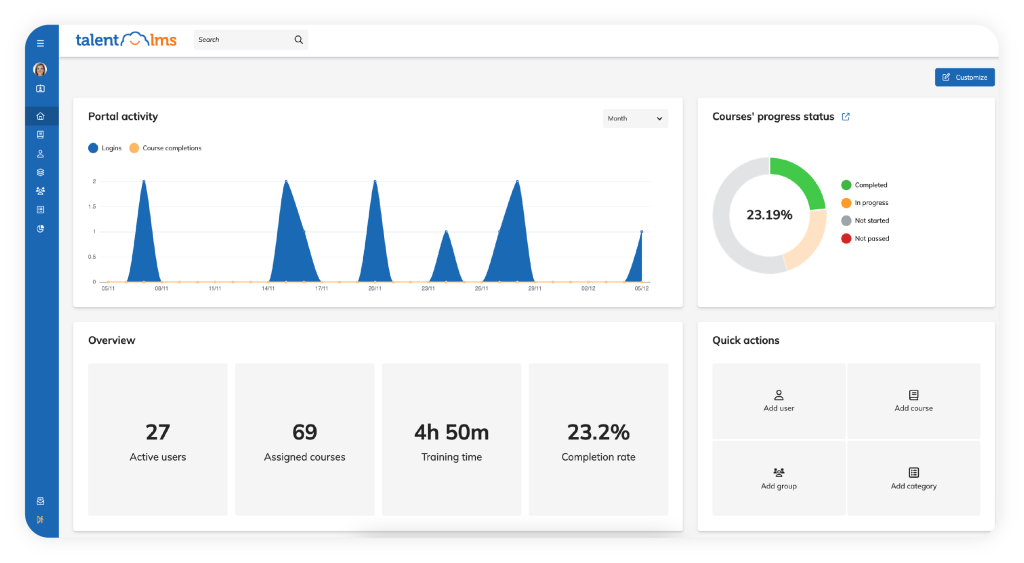
Rating: 4.6/5 (693 reviews)
TalentLMS is a cloud-based LMS with an emphasis on continuous employee training and development. It enables instructors to create brand-new courses with a very short initial setup time. Built-in gamification features like point accumulation and leaderboards help improve learner engagement. Furthermore, extensive custom reports allow instructors to always stay on top of their learners’ progress to guide the training program accordingly.
White labeling allows you to customize the web-based LMS and its mobile app to tailor the platform’s look and feel to reflect your brand identity. TalentLMS is also in the process of revamping its user interface and adding generative AI capabilities to its content authoring tools. TalentLMS features TalentLibrary, a native library of 800+ ready-made courses. It’s the best learning management system for growing businesses looking for a reliable cloud-based LMS to scale their training with.
Key features:
- Content authoring with generative AI (TalentCraft)
- White labeling
- Gamification
- ILT
- Certification
- SCORM-compliant
- Branches (Sub-domains)
- Integrations
- Automations
- Custom reports
Best used for: Small-midsize business (SMB) training, employee onboarding and training, customer and partner training, compliance training
Not the best fit for: Academic learning, selling courses via eCommerce
Pricing: Free plan available. Pricing starts at $69/month.
Looking for an LMS you can easily set up to start training?
Customize your TalentLMS portal and create an engaging experience.
The training platform that users consistently rank #1.

2. Moodle
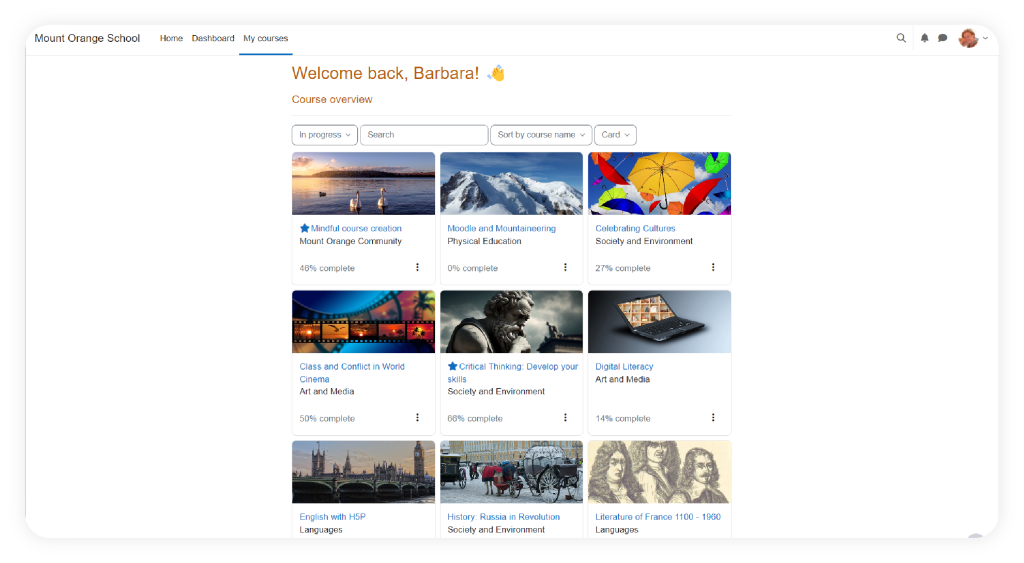
Rating: 4.1/5 (377 reviews)
Moodle is a versatile open-source LMS ideal for academic learning management. It easily integrates with academic tools such as plagiarism detectors, video conferencing tools, student information systems, etc. As an open-source platform, it has a global community of developers, learning experts, and academic professionals actively working to make it the best LMS for everyone.
Moodle also sports an accessibility checker, ensuring all your content is accessible to users with unique learning requirements. Because Moodle is an open-source LMS, it comes with its own quirks, such as that you’ll need someone with IT knowledge on your end to set up and manage your training portal. As a ready-to-deploy solution, it may not be the best learning management system for business training at a scale, especially if you need to seamlessly integrate it with your HRIS, CRM, or other enterprise-level tools.
Key features:
- Open-source
- White labeling
- Integrations
- Learning plans
- Progress tracking
- Custom reports
- Social learning
- Gamification
- Accessibility checker
Best used for: Academic learning
Not the best fit for: Employee training
Pricing: Free plan available. Pricing starts at $120/year for up to 50 users.
3. Docebo
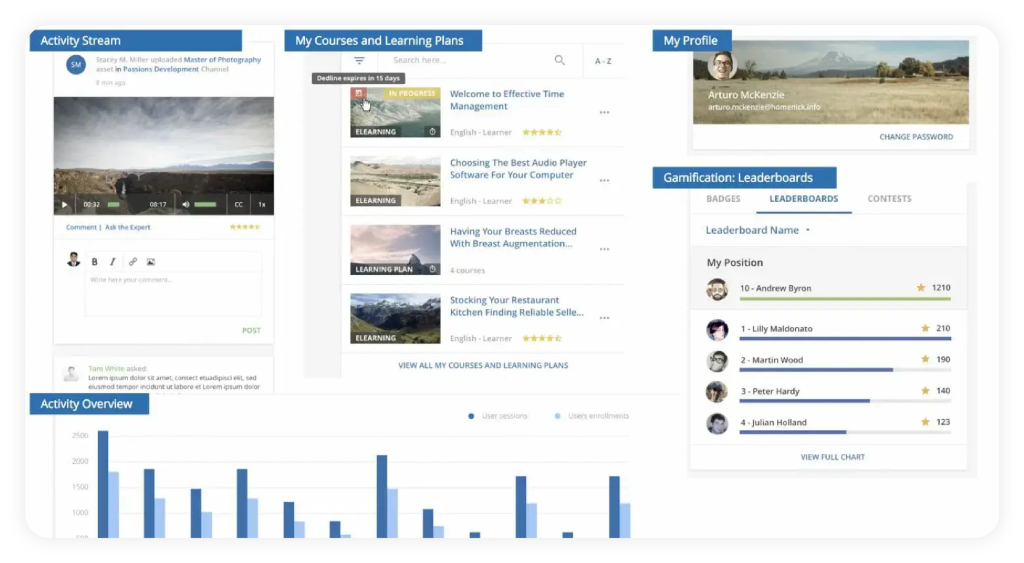
Rating: 4.4/5 (482 reviews)
Docebo is an enterprise-level cloud-based LMS software designed with extensive training management and tracking capabilities in mind. It allows instructors to optimize the training they deploy by addressing learners’ skill gaps through gamification and social learning features. Unfortunately, it doesn’t have built-in content authoring of its own but does provide extensive integration support for other tools that do the job.
Speaking of which, Docebo features over 400 integrations, which works well for training at a scale, especially for global businesses. Because of its well-rounded feature set, it’s one of the best learning management system choices for enterprise-level training, from onboarding to customer and partner training. However, it may not be suitable for small and medium businesses, as well as academic institutions.
Key features:
- AI-guided learning
- Gamification
- Mobile learning
- Social learning
- eCommerce
- Ready-made content library
- Integrations
- Certification
- SCORM-compliant
- Reports
Best used for: Enterprise-level training, government-level training, employee onboarding and training, customer and partner training, compliance training
Not the best fit for: Small business training, academic learning
Pricing: No price listed. Contacting the vendor is required.
4. Thinkific
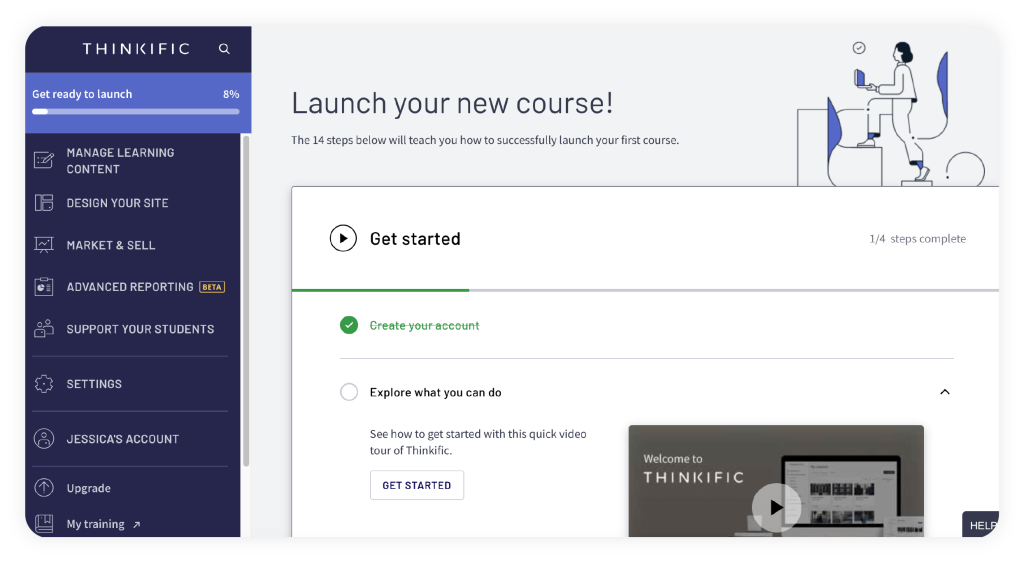
Rating: 4.7/5 (209 reviews)
Thinkific is an LMS with deep eCommerce functionality, allowing you to create dedicated websites to sell courses on. What makes Thinkific stand out is its social learning features, allowing you to build entire communities around specific learning topics. Courses can be sold per license or based on memberships, allowing users to set up a sustainable income pipeline from their course creation efforts.
If you already have a website, Thinkific allows you to connect with it via API. That being said, training at a scale might be an issue with Thinkific, such as in the case of internal employee training, seasonal certification, etc. It’s the best LMS to create content and distribute and monetize it via individual websites.
Key features:
- eCommerce
- Affiliate program
- Content authoring
- White labeling
- Mobile learning
- Social learning
- ILT
- Integrations
- Certification
Best used for: Selling courses via eCommerce
Not the best fit for: Enterprise-level training
Pricing: Free plan available. Pricing starts at $36/month.
5. eFront
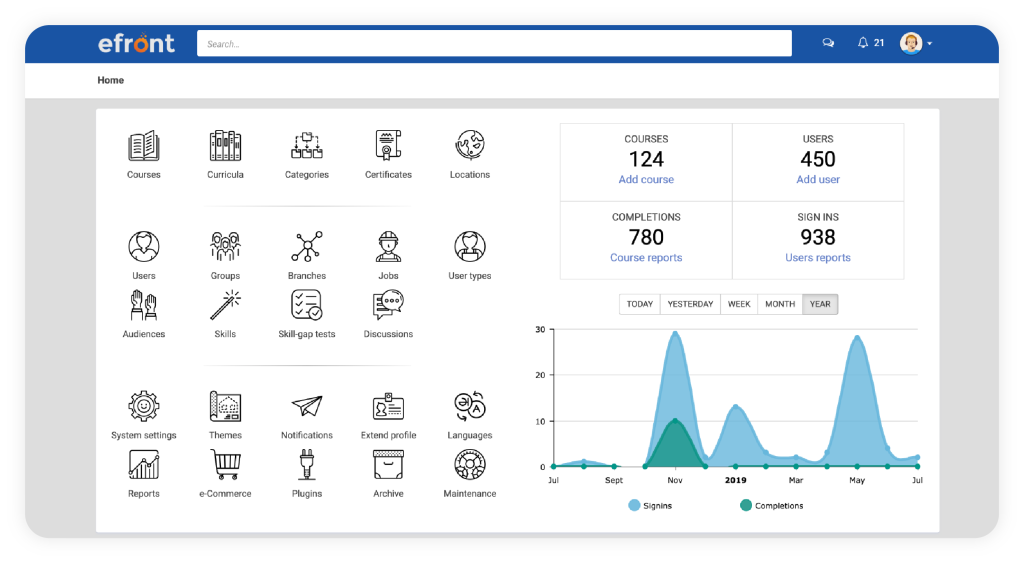
Rating: 4.5/5 (24 reviews)
eFront is a robust, enterprise-level LMS with on-premise and cloud-based deployment. Its features are built to empower instructors to manage training at a scale, starting with 1,000 users and up. eFront allows instructors to continuously monitor their learners’ progress with in-depth reports that they can follow up on with dedicated skills or job role training. In the case of larger enterprises, eFront also enables users to apply for a waitlist to get notified about open slots as they become available.
As an enterprise-level solution, eFront features extensive security features, including SSO, 2FA, OWASP compliance, and more. This makes it the best learning management system for global enterprises needing an LMS platform for continuous training deployment (onboarding, compliance, upskilling, etc.). On the other hand, it’s less optimal for academic learning and SMBs.
Key features:
- Content authoring
- Mobile learning
- Gradebooks
- Gamification
- Learning path
- Job roles
- Certification
- Skills
- Waitlist
- Enterprise-level security
Best used for: Enterprise-level training, employee onboarding and training, customer and partner training, compliance training, continuous training
Not the best fit for: Small-midsize business (SMB) training, seasonal training, academic learning
Pricing: Pricing starts at $1200/month for up to 1,000 users.
6. LearnWorlds
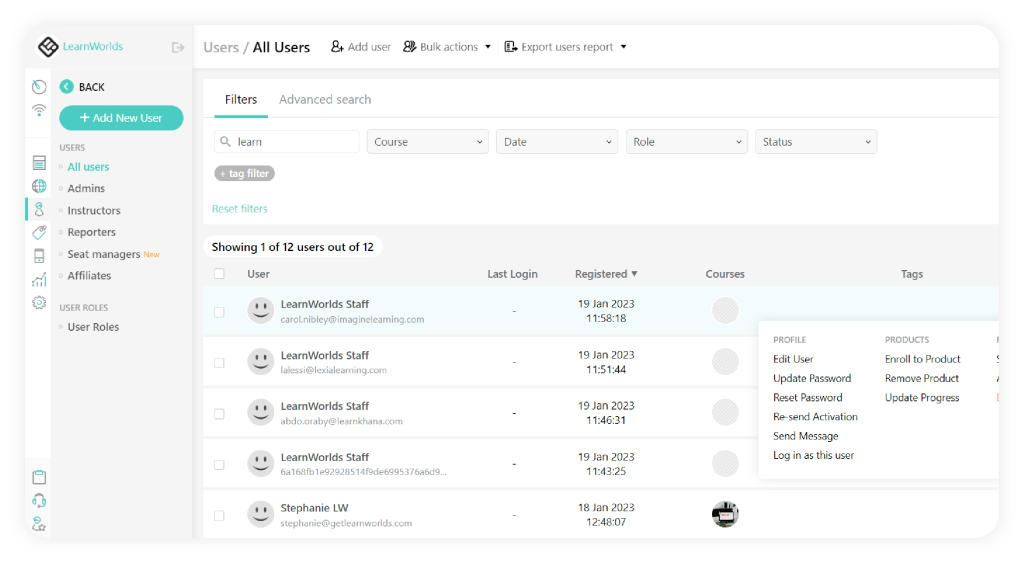
Rating: 4.7/5 (298 reviews)
LearnWorlds is an LMS built for professional service providers, such as coaches, fitness trainers, and others looking for robust eCommerce functionalities. It’s a tool that fits the functionalities of an LMS with those of a CRM to allow for an extensive overview of how courses are sold. It even comes with built-in affiliate program capabilities.
This LMS sports extensive customization options, allowing you to manage your content and user roles precisely to reflect their eCommerce needs. White labeling is a significant component of LearnWorlds, as it features a fully customizable website and mobile app builder. Due to LearnWorlds being oriented towards eCommerce, however, it’s not the best learning management system for internal, continuous training.
Key features:
- eCommerce
- Affiliate program
- Blended learning
- Mobile learning
- Integrations
- ILT
- SCORM-compliant
- Reports
- White labeling
Best used for: Small-midsize business (SMB) training, external training, selling courses via eCommerce
Not the best fit for: Enterprise-level training, employee onboarding and training, compliance training
Pricing: Free trial available. Pricing starts at $28/month.
7. Canvas LMS
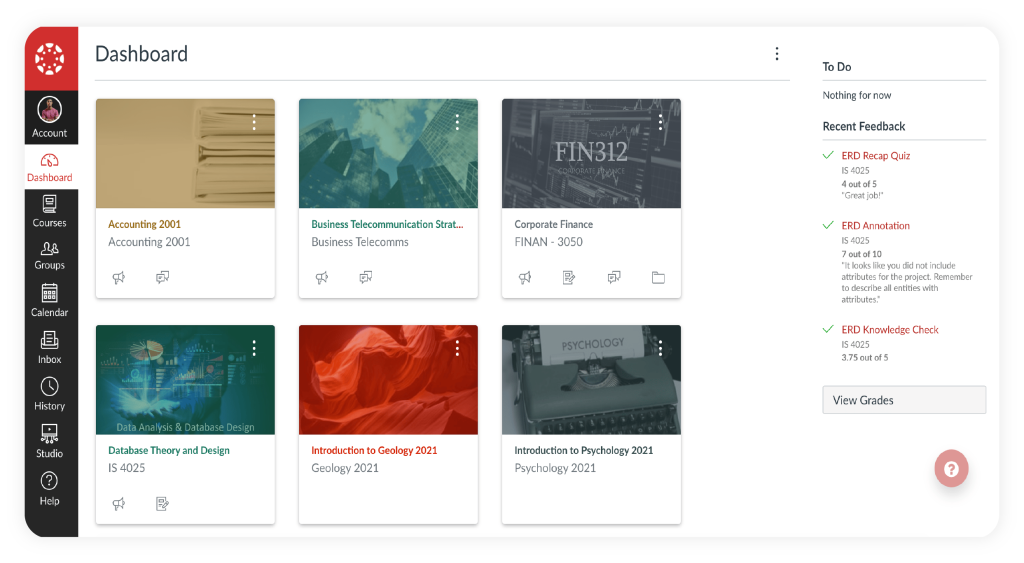
Rating: 4.4/5 (1,476 reviews)
Canvas LMS is geared towards academic learning, focusing on providing instructors with deep learning management features. One of its more unique features revolves around essay writing assignment management. This is a valuable feature to have in an LMS designed for K-12 and higher education institutions that need academic writing assessment tools.
Due to its freemium pricing model, academic instructors can start using it with “Free-for-Teacher” accounts and slowly upgrade their plans to access additional support or access to integrations. However, Canvas LMS lacks many of the features intended for employee training. It doesn’t have certification features, and its reports are limited in what they offer. This makes Canvas LMS far from the best learning management system for seasonal, onboarding, or compliance training.
Key features:
- Freemium pricing
- Open-source
- Content authoring
- Social learning
- Mobile learning (online only)
- Integrations
- ILT
- Essay writing assignments
- Attendance tracking
Best used for: Academic learning
Not the best fit for: Employee onboarding and training, seasonal training, compliance training
Pricing: Free plan available. No price listed. Contacting the vendor is required.
8. Trainual
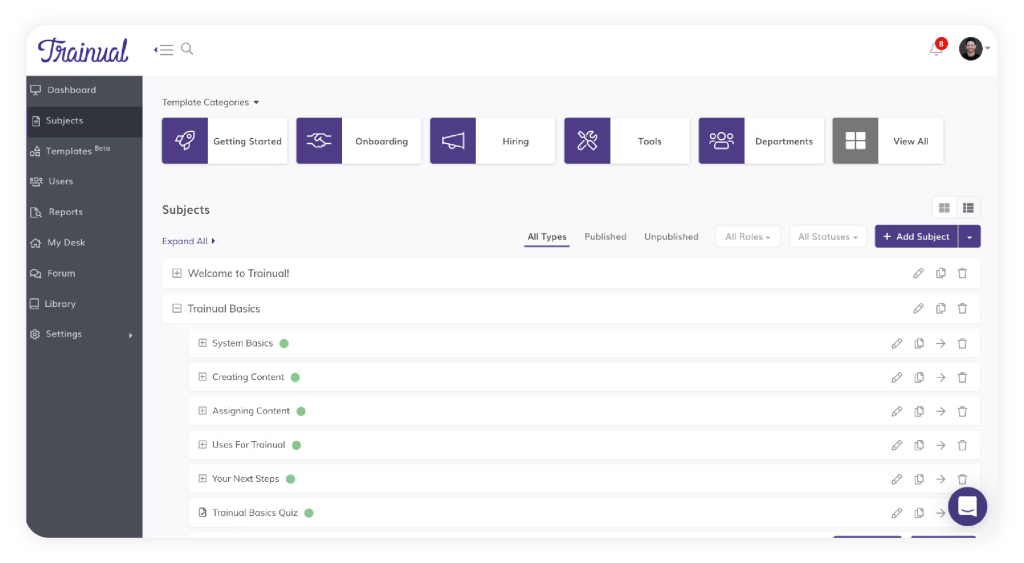
Rating: 4.7/5 (599 reviews)
Trainual is an LMS designed to empower HR professionals in managing their organizations. It features rich organizational management tools to facilitate systematic change management. Its organizational chart and team directory features are tailored toward smart and precise people management. It enables you to keep track of all of your processes, policies, and SOPs, similar to an HRIS platform.
To ensure every bit of info shared with employees is verified, Trainual also enables you to add e-signatures to any document uploaded to the platform. As an LMS+HRIS, Trainual has a very specific set of features that will undoubtedly help HR managers. However, as purely learning-oriented LMS software, Trainual doesn’t offer the same level of content customization or training management as some of the other best learning management system choices on our list.
Key features:
- E-signatures
- Advanced documentation management
- Screen recording
- Mobile learning
- White labeling
- Organizational & role charts
- Integrations
- Change management
- Progress reports
Best used for: Employee onboarding and training, compliance training
Not the best fit for: Selling courses via eCommerce, external training, academic learning
Pricing: Free trial available. Pricing starts at $250/month.
9. Coassemble
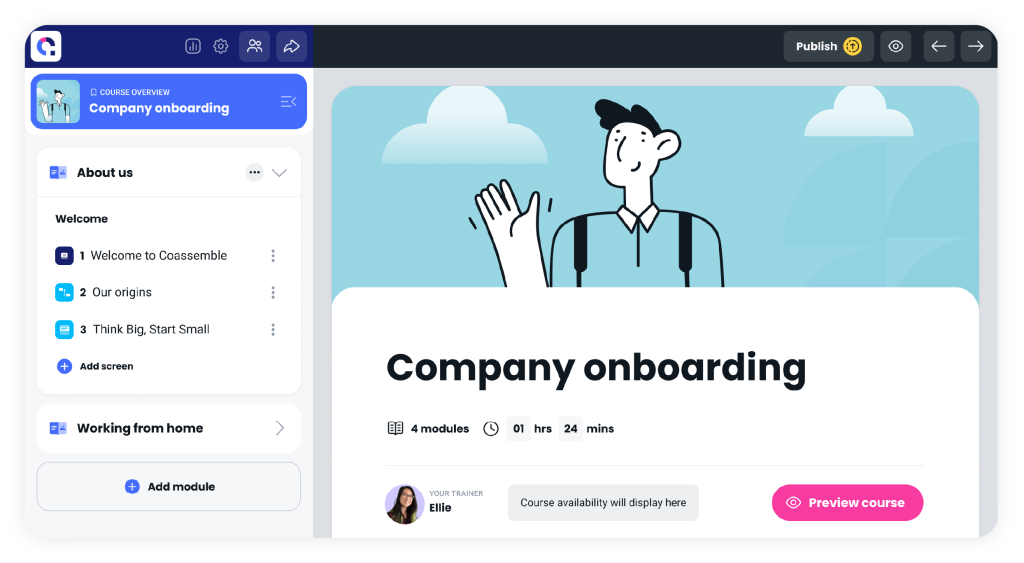
Rating: 4.6/5 (168 reviews)
Coassemble positions itself as an employee training LMS. However, its features are highly geared toward instructional designers and L&D managers. It’s primarily a SCORM-compliant content authoring tool that enables you to create beautiful courses in a matter of minutes. Then, these courses can be plugged into a dedicated LMS platform.
In essence, it works best when combined with one of the other best learning management system solutions on the list. On its own, it doesn’t feature the features of some of the other best LMS solutions on our list, such as reports, progress tracking, or user management functionality. As a learning content management system (LCMS), it’s a powerful tool that can help instructors create engaging, interactive learning experiences.
Key features:
- Content authoring
- AI-powered quizzes
- White labeling
- Interactive screen builder
- Course templates
- Photo library
- Course feedback
- SCORM-compliant
Best used for: Small-midsize business (SMB) training, external training,
Not the best fit for: Academic learning
Pricing: Pricing starts at $5/month.
10. Easy Generator
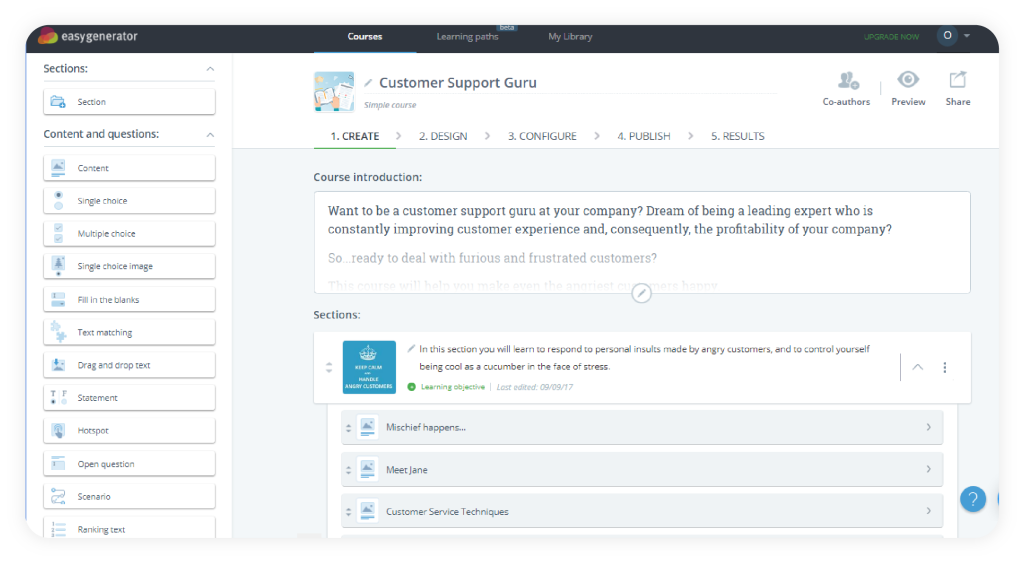
Rating: 4.7/5 (60 reviews)
True to its name, EasyGenerator is an LMS built for intuitive course creation and management. Its templates make it quick and easy for you to create new courses regardless of their instructional experience. It features rich accessibility with color contrast controls, keyboard navigation, and WCAG/Section 508 compliance for learners’ benefit.
You can easily download courses built in EasyGenerator as SCORM or xAPI files and use them in other LMS solutions. EasyGenerator lacks in-depth reporting and learner engagement features found in more enterprise-level solutions, however. This makes it among the best learning management system choices for SMB training, but it may be inadequate for training at a scale.
Key features:
- Content authoring
- Co-authoring
- White labeling
- Mobile learning
- Video editor
- Text-to-speech
- Auto-translation
- Assessments
- Course templates
- SCORM-compliant
Best used for: Small-midsize business (SMB) training
Not the best fit for: Enterprise-level training, academic learning
Pricing: Free trial available. Pricing starts at $108/month.
What is a learning management system (LMS)?
A learning management system (LMS) is software for managing, delivering, and tracking learning. Each LMS has a different set of features based on its target audience and intended use. For example, some are tailored for employee training, while others work best in academia.
With the best learning management system solutions, you can easily place content like PDF documents, video and audio files, or even SCORM files onto your portal as part of training courses. Depending on your plans, you can assign these courses to your users or sell them through eCommerce.
Once you’ve assigned training, the best learning management system should also allow you to track your learners’ progress with reports. These reports are often customizable and enable you to pinpoint the data you need so that you can analyze your eLearning program’s success.
Increase learner engagement and training success with the top LMS.
Manage your learners, track their progress, and deliver training that sticks.
Easy to set up, easy to use, easy to customize.

What to look for in a learning management system (LMS)
Given that every LMS is uniquely built to serve a certain function, ranging from training to academic assessments and even online sales, each comes with a slightly different set of features. So, when reviewing and choosing your go-to platform from the list of the best LMS systems, what should you focus your attention on?
Customization
White labeling your portal is important because this allows you to make your training portal truly your own. The ability to customize the colors, background, and homepage or even use a custom domain can make your portal more unique and memorable. If the LMS also allows you to create sub-portals, being able to customize each for different types of learners makes your entire training program easier to manage.
Gamification
Everything’s more fun with a bit of healthy competition, and the best learning management system should be able to facilitate that. eLearning gamification lets users earn points, levels, badges, and other achievements or rewards for their efforts as they complete courses. By combining points with leaderboards, users can compare their progress to their peers and compete for the top spots on the leaderboard.
Integrations
In today’s cloud-based age, no software is an island. Being able to integrate different solutions with your LMS can make managing your learning program easier and faster. For example, HRIS tools like BambooHR let you pass learner info to and from your existing employee database. The more valuable tools you can combine with even the best LMS, the more efficiently you’ll be able to manage your L&D initiative.
Reporting
Reports give you a detailed overview of your learners’ activities on your training portal. Depending on the type of training you’re providing them with, you may want to keep track of how many learners finished a certain course, how many failed a test, or how long a course took to complete on average. Ideally, reports in the best learning management system solutions can also be scheduled for automatic exporting and sending to a list of email addresses (instructors, HR managers, etc.) for record keeping.
Mobile learning
With mobile devices becoming a vital part of our daily lives, the LMS you rely on should also support mobile learning. Whether it allows users to log in through their browsers or a dedicated Android or iOS app, the best learning management system should provide you with the ability to deliver training to learners on the go. Some of them also go a step further and allow you to customize your LMS mobile app to match your branding.
Pricing model
The best LMS vendors rely on a pricing model that provides businesses with a worthwhile value-for-money proposition. Some LMS solutions use per-user pricing models, while others offer bulk user prices (100/500/1000, etc.). Others keep certain advanced features exclusive to higher subscription tiers. A great way to learn whether a platform is actually the best LMS for you is to get in touch with the vendor and talk to a sales rep, especially if you need to host a large number of users on your training portal over long periods of time.
Types of learning management system integrations
Integration with other software solutions is what truly powers a great training program. Being able to integrate existing databases, systems, and tools with your LMS will make managing it faster, easier, and more convenient. What types of integrations should you look for when choosing the best LMS for your organization?
Human resource information system (HRIS)
An HRIS tool is what makes managing your people’s data much easier. Some examples of great HRIS tools include TalentHR, BambooHR, and Sage People. With the best learning management system that will integrate well with your HRIS, you’ll have a more efficient training pipeline to work with. This will make keeping everyone’s info up to date an automated process, allowing you to focus on nurturing your people’s growth instead of micromanaging their data manually.
Customer relationship management (CRM)
Your CRM is the lifeline of your organization if you rely on a commercial business model. And with your sales staff being used to tools like Salesforce, you want to ensure they can easily access training as you assign it. The best LMS tools will always support native CRM integration right out of the box. They enable you to pass your staff’s data between the LMS and your CRM automatically so that everyone’s always on the same page about training.
Single sign-on (SSO)
SSO simplifies how users can log in and interact with training courses on your portal. With SSO enabled, you can also keep your LMS portal more secure by limiting who can access it at any point. This integration can also allow your users to log in using their social media credentials, such as their Facebook or LinkedIn accounts. Some popular SSO integrations you should look for in the best LMS solutions include LDAP, SAML 2.0, Okta, and OpenID, to name a few.
eLearning standards and extensions
To ensure your training is as rich and engaging as possible, you can use different eLearning standard formats to expand the variety of your course content. SCORM, xAPI, and cmi5 are some of the most popular types of integrations you can use to make your training more successful. With these and similar integrations, you can make your courses more interactive and your training data cleaner in the long run.
Javascript integrations
With Javascript, you can expand the capabilities of even the best LMS with useful new features and insight into your users’ activities. For example, you can integrate Google Analytics or even live chat functionality into your portal with Zendesk chat. Javascript is a powerful integration that can truly open up new doors to training portal customization for your developers.
Customization tools
If you want to go a step further in customizing your learning management system, you should be able to do so with the right integration. Giving your developers the tools to shape the LMS platform to fit your needs is pivotal to making the training portal truly yours. The best learning management system will always let you use its API to automate different actions on the platform or integrate your portal with a WordPress website for smoother learner management.
Zapier integrations
Zapier is a tool that makes it possible to connect with hundreds of web apps that may not be natively supported by even the best learning management system. With Zapier, it’s easy to connect your training portal with tools like Mailchimp, Slack, Zendesk, and more. Zapier doesn’t limit you to the officially supported integrations of an LMS and gives you far more flexibility and freedom in customizing your training portal to reflect your organization’s needs.
eCommerce
These integrations power up your online selling capabilities. Without them, you won’t be able to easily manage your course sales, subscriptions, or other forms of content monetization. If you plan to monetize your courses, the best LMS to look for is one that supports payment systems like PayPal and Stripe, as well as eCommerce systems like Shopify and WooCommerce.
Calendars
Calendar tools make it easy for your instructors and learners to keep track of upcoming learning activities. Once you synchronize your calendar tool with your LMS, you’ll be able to automatically pass data between the two and ensure everyone stays on top of their training at all times. Some of the tools your LMS should integrate with include Google Calendar, Outlook Calendar, and Yahoo Calendar.
Choosing the best LMS for your needs
Now, actually choosing the best learning management system for your needs might seem overwhelming. With so many options available, it’s only natural you’d feel unsure of what to do next. Here are a few easy tips for narrowing down the best LMS fit for your needs.
- Who is your learning audience?
- How many users do you need to host on your LMS portal?
- Are you looking for a solution for seasonal or continuous training?
- Will you produce courses in-house, or do you need ready-made courses?
- Check whether the LMS supports integration with your existing software
- Create a trial/free account
- Compare the pricing of the best LMS choices to your available budget
- Get in touch with a sales rep for a live demo of the LMS
Start training with the best LMS in 2024
There’s no one-size-fits-all best learning management system. Each solution focuses on solving a different set of training challenges. But, no matter the type of training you plan to put into practice in your organization, there’s bound to be LMS software out there that’s perfect for you.
Make a shortlist of the hurdles you face and compare them to some of the best LMS systems we’ve covered. With the right LMS backing you, you’ll have everything you need to empower your people with the latest skills, compliance training, and other L&D needs in 2024 and beyond.


![The 10 Best Learning Management Systems for Employee Training [2024]](https://images.www.talentlms.com/blog/wp-content/uploads/2024/03/Best-employee-training-LMSs_Big.png)
